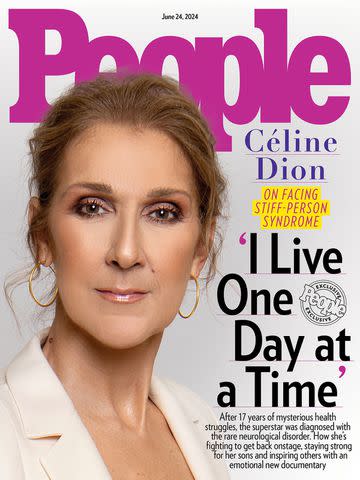Céline Dion’s Doctor Makes Plea for More Stiff-Person Syndrome Research (Exclusive)
“The awareness that we see with Céline bringing this to the general population… people are going to be interested in finding a cure and better treatments for this disease,” Dr. Amanda Piquet tells PEOPLE

University of Colorado Medicine; Getty
Celine Dion and Dr. Amanda PiquetCéline Dion’s doctor is hoping that the singer’s decision to share her journey with stiff-person syndrome will be a catalyst for more research about the debilitating and rare autoimmune and neurological disorder.
Dr. Amanda Piquet, who serves as director of the autoimmune neurology program at the University of Colorado and is the physician who diagnosed Dion, tells PEOPLE in this week’s issue that the disease is widely unknown — even in the medical community.
Stiff-person syndrome (SPS) is an incurable neurological disorder that affects the central nervous system, specifically the brain and spinal cord. It’s associated with slurred speech, double vision and painful muscle contractions that can become so severe that patients lose their ability to walk or speak.
“You can think about it as putting the brakes on the nervous system,” Piquet explains. “So if you're not able to put the brakes on, you have symptoms of hyper excitability, muscle spasms.”
In Dion's case, the five-time Grammy winner grappled with muscle spasms in her throat and feet. She had difficulty breathing and walking, vision issues and, most severely, "crisis" episodes during which her body became stiff as a board as she endured excruciating pain.
Piquet says these “crisis” episodes typically occur in the legs or trunk — chest, stomach and back. They are often mistaken for seizures; however, they are much different.
“Most people in their lives have experienced a charley horse in their calf. So imagine not just that muscle, but all the muscles in the body are involved, that can be extremely distressing and extremely painful,” she says. “It can last minutes to hours.”
Never miss a story — sign up for PEOPLE's free daily newsletter to stay up-to-date on the best of what PEOPLE has to offer, from celebrity news to compelling human interest stories.

ALICE CHICHE/AFP/Getty
Celine Dion performs on the opening night of her new world tour "Courage" on September 18, 2019.Related: Céline Dion Diagnosed with Stiff-Person Syndrome — Here's What to Know About the Rare Condition
SPS tends to be a progressive disease, Piquet adds, so it’s common to see patients having minor symptoms that build over time and become more disabling. She says it’s also difficult to gauge when these spasms will occur, and that every patient will experience different levels of severity.
That’s why Dion’s diagnosis came 17 years after she first started noticing signs.
“It's a hard disease to diagnose because it's not well recognized by the medical system,” Piquet explains. The common age of diagnosis is around 50.
“This is a rare disease, and it can look a lot like other things. So at first when the muscle spasms start, they tend to just come and go and it can mimic many other neurologic diseases,” she continues, noting that the disorder is often misdiagnosed as multiple sclerosis or Parkinson's disease.
As there is no cure for SPS, treatment plans are typically centered around immunotherapy — targeting the underlying autoimmune disease — and symptomatic therapy. This includes antispasmodic agents and muscle relaxers, as well as physical therapy, massage therapy, hydrotherapy.
“A lot of my patients are so determined to just find better treatments for this disease because it is just so devastating,” Piquet admits.
The PEOPLE Puzzler crossword is here! How quickly can you solve it? Play now!

Having Dion speak out publicly about her own experience with the disorder will undoubtedly be life-changing for many others struggling with SPS, says Piquet.
"We don't have FDA-approved therapies for this disease. While we use these treatments, everything is off-label," explains Piquet, who estimates that 2 in every 100,000 people are fighting SPS. "I've certainly had patients that have clear improvements with these therapies, but we need clinical trials and research to tell us what truly is best."
As Piquet and her team continue making strides in research (an epidemiology study they recently submitted is currently under review), the physician urges patients to remain hopeful.
“Between the awareness that we see with Celine bringing this to the general population and our epidemiology study, people are going to be interested in finding a cure and better treatments for this disease,” she says.
“We need to do better, and I think the research is coming.” Piquet tells PEOPLE. “The future for SPS is bright and there's a lot on the horizon. And while we don't have a cure for this disease, there's definitely things that we can do to help manage the disease.”
For all the details on Céline Dion's stiff-person syndrome diagnosis and her fight to get back to the stage, pick up the latest issue of PEOPLE, on newsstands now.
For more People news, make sure to sign up for our newsletter!
Read the original article on People.

 Yahoo Lifestyle
Yahoo Lifestyle 